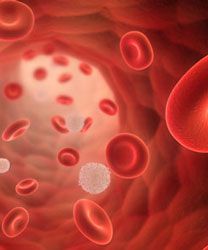First Cohort Enrolled in Study of Conjugate Recently Granted Orphan Drug Designation in Myeloma
Enrollment in a phase I/II clinical trial began recently for a study of PT-112 monotherapy in patients with relapsed or refractory multiple myeloma, according a news release from Phosplatin Therapeutics LLC, the company developing the small molecule conjugate.
blood cells

Enrollment in a phase I/II clinical trial began recently for a study of PT-112 monotherapy in patients with relapsed or refractory multiple myeloma, according a news release from Phosplatin Therapeutics LLC, the company developing the small molecule conjugate.
The agent also received an orphan drug designation from the FDA for the treatment of patients with multiple myeloma on February 7, 2018, the same day the first cohort of patients in the phase I/II dose-finding study completed enrollment.
PT-112 is a first-in-class conjugate of pyrophosphate and platinum that promotes apoptosis with damage-associated molecular patterns, which activates immunological effects, such as downstream T-cell recruitment in the tumor microenvironment.
"Given PT-112's successful clinical development track record in solid tumors, its mechanism of immunogenic cell death, and its unique osteotropic properties, it is exciting to build upon our successful translational research and to expand the clinical research of PT-112 into treating patients with relapsed or refractory multiple myeloma," said Robert Fallon, president and CEO of Phosplatin Therapeutics, in a statement.
The multicenter, open-label phase I/II study consists of 2 parts. In the first part, which has finished enrolling patients, cohorts of 3 patients each will receive escalating doses of the agent until the maximum-tolerated dose is reached and the recommended phase II dose has been determined. In the event of a dose-limiting toxicity, cohorts will be expanded to include 6 patients. The second part of the study will include an expansion cohort of 14 patients who will be treated at the recommended dose, based on the phase I portion, to confirm the tolerability and evaluate efficacy with PT-112 treatment.
Patients with an ECOG performance status of 0 to 2 were eligible for the study and must have received at least 1 prior treatment regimen.
The recommended phase II dose is the primary endpoint of the study. Secondary endpoints include dose-limiting toxicities, safety profile, duration of response, progression-free survival, and more.
The conjugate is also being investigated in studies of other hematologic malignancies and solid tumors. In a phase I study of PT-112 in patients with advanced solid tumors, the maximum-tolerated dose was not reached with cumulative doses up to >6000 mg/m2administered safely.1Across all dose levels, the most common treatment-related adverse events (AEs) included grade 1/2 fatigue (24%), nausea (18%), and vomiting (12%).
The study investigators noted that 1 patient with nonsmall cell lung cancer who had received 6 prior lines of therapy experienced a partial response on PT-112 treatment.
In a poster presentation at the 2017 ASH Annual Meeting, PT-112 demonstrated an ability to localize in bone compartments, suggesting that the treatment may be effective in disease that originates in or metastasizes to the bone, as in multiple myeloma.2
References:
- Karp DD, Camidge DR, Bryce AH, et al. A phase I study of PT-112 in advanced solid tumors.J Clin Oncol. 2017;35(suppl 15; abstr 2519). meetinglibrary.asco.org/record/147226/abstract.
- Ames TD, Sharik ME, Rather GM, et al. Translational research of PT-112, a clinical agent in advanced phase I development: evident bone tropism, synergy in vitro with bortezomib and lenalidomide, and potent efficacy in the Vk*MYC mouse model of multiple myeloma. Presented at: 2017 ASH Annual Meeting; December 9-12, 2017; Atlanta, GA. Abstract 1797.